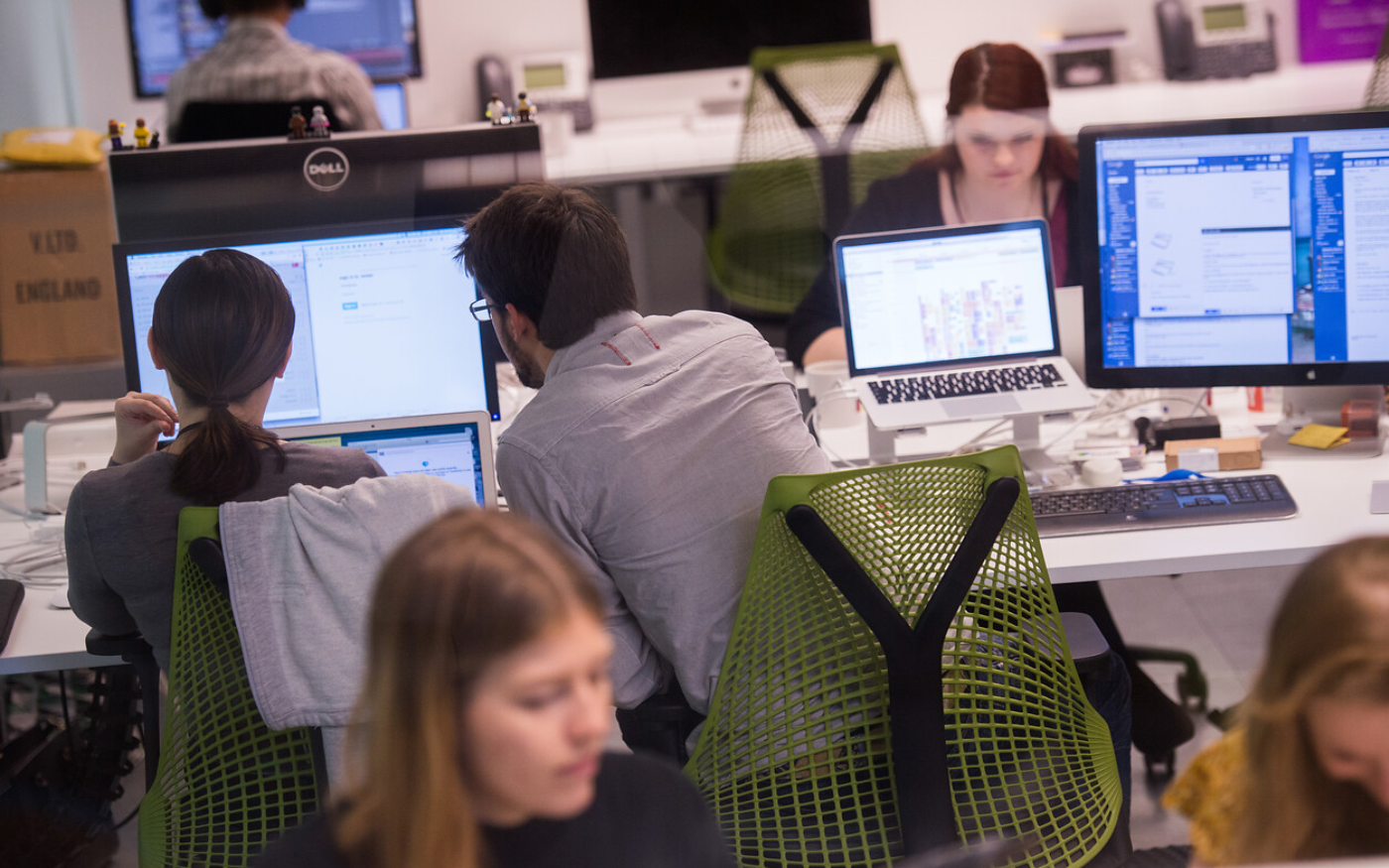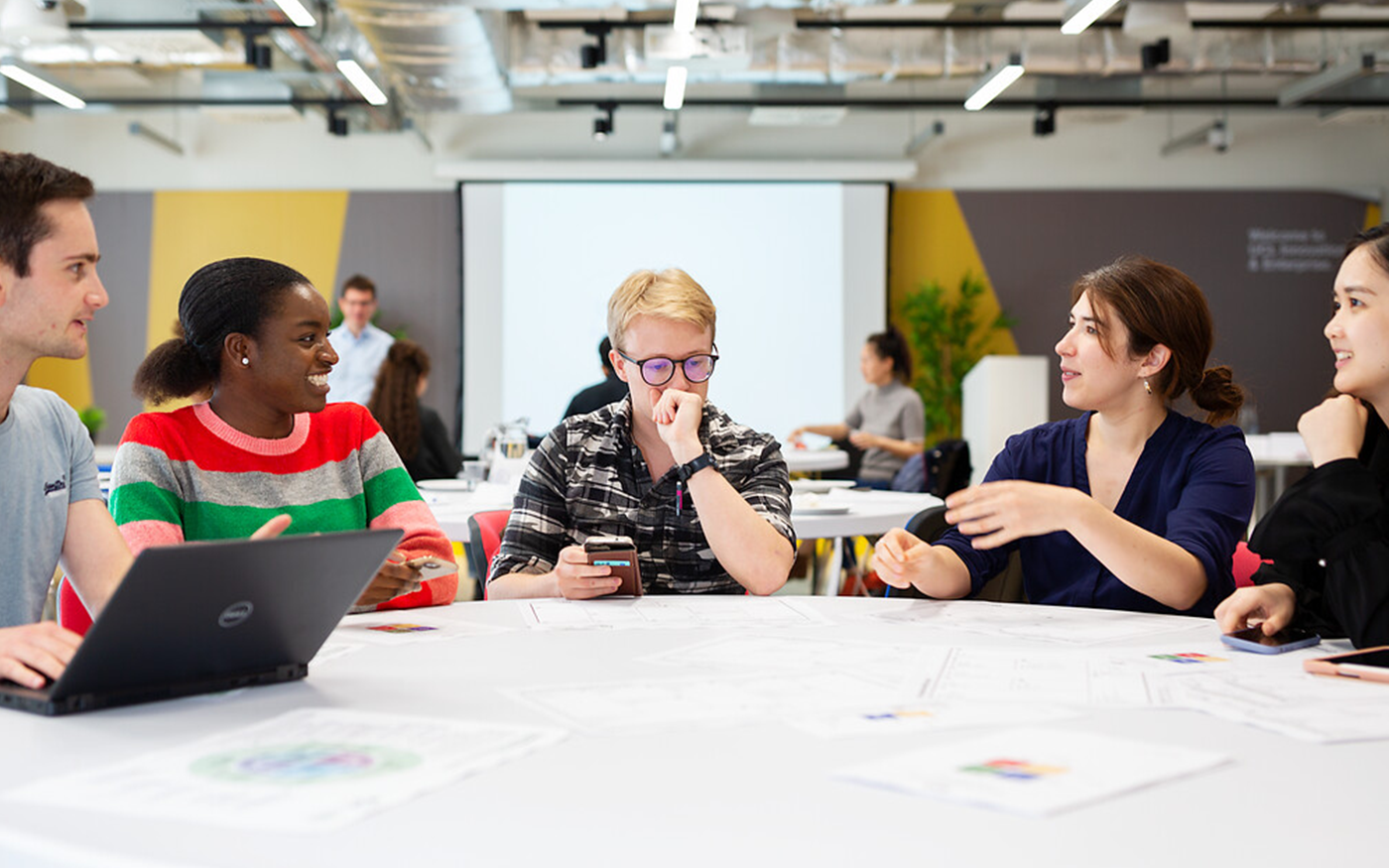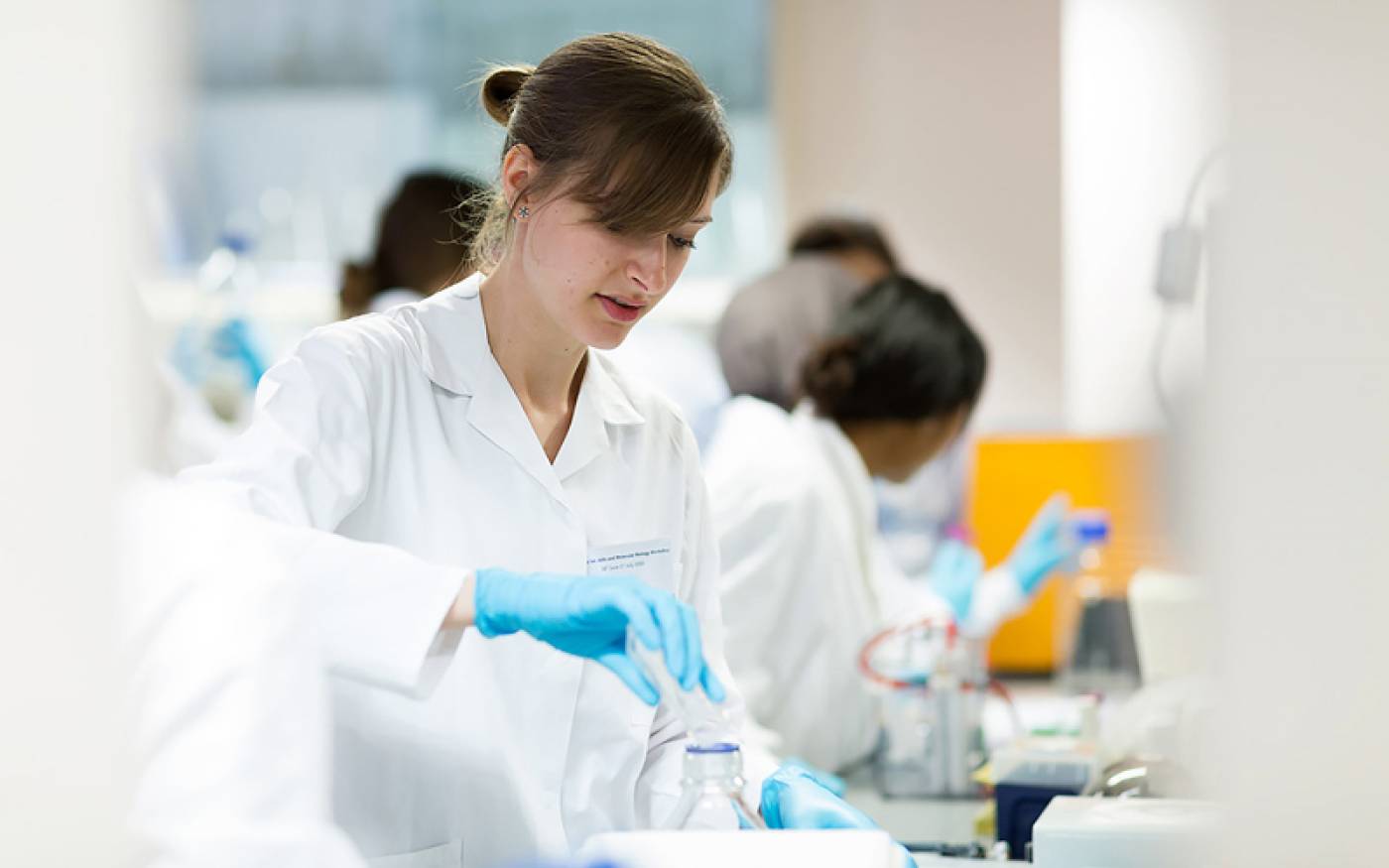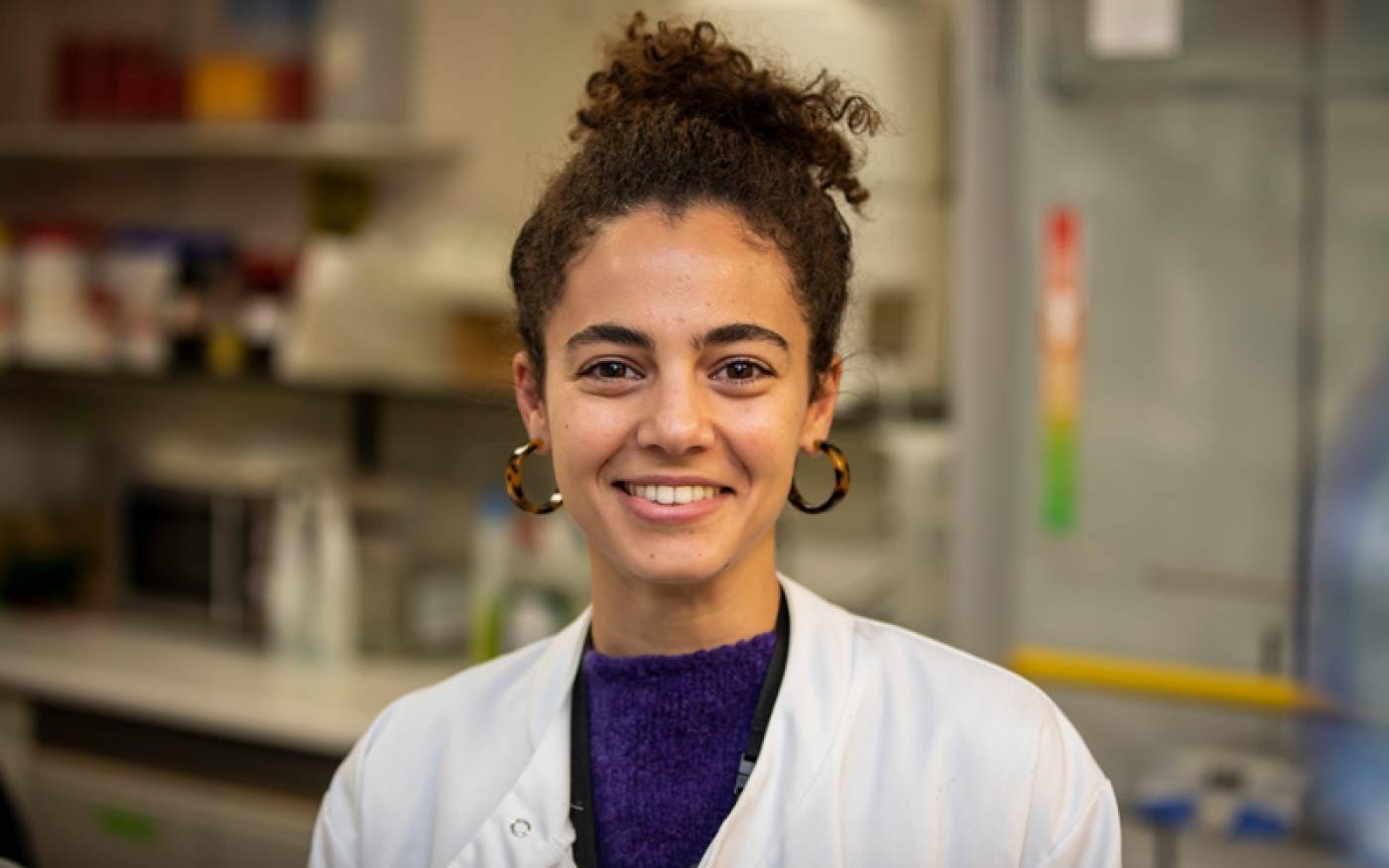Bioscience Innovation and Enterprise MSc
Key course information
- Start date: September 2024
- Duration: 12 months full-time, or 24 months part-time
- Fees: UK £15,100 (full-time) or £7,550 (part-time) and Overseas £34,400 (full-time) or £17,200 (part-time)
- Application deadline: Applicants who require a visa: 31 July 2024 (5pm UK time). Applicants who do not require a visa: 30 August 2024 (5pm UK time)
- Entry requirements: undergraduate degree with a minimum of 2:1 honours (or equivalent) in a relevant science or medical discipline. For international students, the UCL English Language level required is Level 2.
- Register here to virtually meet with a Course Director.
For key information, including tuition fees and entry requirements, visit the UCL Graduate Prospectus.
Please note, this course was previously called Bioscience Entrepreneurship MSc. Although the title has been changed, the course content is substantively the same.
Course structure
The UCL Bioscience Innovation and Enterprise MSc is run by the UCL Institute of Ophthalmology, but you will be take a number of modules from the UCL School of Management and UCL School of Pharmacy. You’ll learn from each of these world-leading departments about how science knowledge can be turned into new social and economic value, to make a real-world difference. This is one of the first degrees of its kind worldwide to offer business education specifically for scientists.







Turning science into useful innovation means that scientists need to understand the language of business, such that they can interrogate the science for potential value and translate that potential into the valuation frameworks used by industry and global institutions. Bioscience innovation is often a long journey. It needs patient funding, from a wide spectrum of public sector and commercial funders. It often gets implemented in dynamic market sectors, complex health systems and under strong regulatory controls.
From the start you will be taught by translational scientists and business people who have successfully navigated the science-business interface to create new value from ideas. UCL’s Institute of Ophthalmology, the home department for this degree, is linked to Moorfields Eye Hospital. This is ranked as the leading university-research collaboration in a specialty area.
Eye scientists study everything from cell biology, genetics, digital health, artificial intelligence, imaging, through to global health and are renown for their innovation and translational expertise. UCL School of Management is a fast-growing business school department with specialties in innovation, entrepreneurship and analytics. UCL School of Pharmacy has a long-established reputation of industry partnering and spinouts.
You’ll find yourself amongst like-minded students with a science background who share a purpose to drive innovation into successful enterprise. Our students come from a variety of countries, from many different scientific and medical backgrounds, but they all share ideals of how business education can empower scientists.
Using UCL’s network and reputation is also a starting point to access London’s entrepreneurial bioscience ecosystem. UCL Innovation & Enterprise runs events, incubation facilities and training programmes for emerging entrepreneurs. The university is closely connected to the Crick Institute, the clinical excellence of Moorfields Eye Hospital, the Wellcome Trust and MedCity in London.
As a summary, this course is suitable for anyone who:
- Wishes to explore the science-business interface for ideas and inspiration
- Wants to pivot to working with science in a business setting such as in investment or consultancy
- Feels they would like to be a new venture creator, and lead their own bioscience-based enterprise at some point in the future
Additional notes
- Some students take this as a part-time course over two years, such that they can continue working. These students can work on a dissertation or other investigative assignment that is related to their work.
- This course does not assume any knowledge of business or management prior to starting the MSc. It takes a steep learning curve, and covers in depth the areas that are most relevant to bioscience innovation and enterprise.
- In 2024/25, the name of this course will be changing to the UCL Bioscience Innovation and Enterprise MSc. Students on the 23/24 intake can refer to their degree either as the UCL Bioscience Entrepreneurship MSc, or they can use the new title starting from Sept 2024.
Course overview
- Teaching location
This course is based for the first term, which runs late September to December, in the Institute of Ophthalmology, for the compulsory science translational modules. The Institute is in the Shoreditch area of London. For the second term, you are based primarily at the UCL site in Bloomsbury, where you take one compulsory School of Management module and can choose other Management and Pharmacy modules from the options below. For the final term, you write a research-business dissertation project, that explores an area of science, technology or medicine and makes a business case for that innovation. Some students do this in collaboration with a company.
- Teaching methods
Our teaching methodologies include a variety of learning styles, for example the flipped learning approach and collaborative groupwork. You are expected as a student on this course, to contribute to our co-creative learning environment, to pitch ideas, to discuss and engage with the material. Your work will feature written and ‘live’ assessments, such as through an investor pitch deck, summarising science for different audiences, finding evidence to validate conceptual ideas, and working in groups, including with students from other disciplines across UCL.
This course is in its third year. We have in the past offered some hybrid (online and offline) sessions, but the expectation is that you will attend all classes face-to-face in 2023-2024.
- Your employability and career destinations
This is a new course. The 2023-24 cohort will be the fourth year of this course. Students from the first two years have gone on to careers in management consultancy, venture capital, research translation, start-ups and spinouts, policy, PhD programmes and more. Science has achieved new prominence since the pandemic. Our boundary-spanning innovative students have many options in the UK and globally for purposeful careers.
- Student diversity
- Our cohort is made up of approximately 40 students
- Around 25% are from the UK, with 75% from the EU and the rest of the world
- Three-quarters are new graduates or intercalating medical students; others have 3-5 years + work experience, often in a science based environment
- Consideration can be given in application to students who have some entrepreneurial experience, gained either in a university setting or in an enterprise
- Undergraduate degree backgrounds include biochemistry, biomedical sciences, medicine, genetics, bioinformatics, biology, agricultural sciences and many others
Our mix of students, who have a common background in science, and a common purpose in exploring the business of science, is a powerful asset in this course. Drawing together from this range of perspectives and experience to examine the science-business interface builds a very positive teaching environment. Our teaching staff are exemplary boundary-spanners themselves, and many are world-leading researchers. Our aim is to offer a comprehensive mix of skills, knowledge and mindsets to empower a new generation of scientists to make a difference in the world.
- Learning outcomes
On completion of this course, you will have:
- An understanding of how bioscience intersects with business
- Knowledge, skills and mindset that support entrepreneurial activity
- A bespoke business education that focuses on scientific innovation
- Exemplary boundary-spanning communication and leadership skills
- Understanding of the ethical, regulatory and legal constraints around research in businesses based on living entities
- Opportunity recognition skills to identify potential life science opportunity
- Awareness of how new venture creation works in organisations, the priorities, practices and purpose behind the drivers for organisational innovation
Application requirements and next steps
This course is suitable for a wide variety of students with a science background who wish to gain a bespoke business school-type education focused on innovation. It is suitable for aspiring entrepreneurs, those who wish to work in translational roles or with innovative science, students who wish to work in corporate environments that work with life sciences, and many more.
The requirement is for a bioscience degree at 2:1 or equivalent. Intercalating medical students are eligible to apply. Others with work experience or entrepreneurial experience can include that in their application. Some applicants can demonstrate interest in pursuit of a career involving innovation, valuation of science, social purpose, commercialisation interest or other activity at the science-business interface.
Your course team
Learn more about this course with short introductions to some of our modules below.
Benefits of studying the Bioscience Innovation and Enterprise MSc
Why study at UCL?
- In biomedical and health sciences, UCL is 1st in Europe for papers in the top 5% of their field by citation rate (2015-2018, CWTS Leiden Ranking 2020).
- UCL is ranked 8th in the world (QS 2023).
- The UCL Institute of Ophthalmology is ranked the best place in the world to study ophthalmology (CWUR Rankings by Subject 2017).
- UCL hosts more UKRI Future Leader Fellowships than any other UK university, with three academics at the UCL Institute of Ophthalmology receiving the prestigious fellowships over the last three years.
- Our longstanding partnership with Moorfields Eye Hospital represents the largest co-located site for eye research, education and care in the world.
- As a student you will have access to innovative facilities, connection to a growing network of peers, and support from highly experienced and professional tutors.
- Interacting with London and the wider ecosystem
We encourage a self-starter attitude to exploring the science-business interface in London, and in engaging with the entrepreneurial communities in and around UCL. There are many events, training workshops, competitions, seminars and more where you will have the chance to extend your learning. Students are encouraged to work in a collaborative manner, with each other, and with the teaching teams.
Our goal is to build from this course a supported alumni community who connect back into the course once they have left. As an alumni MSc Bioscience Entrepreneurship, you will be invited to share your experiences, join the current cohort for events, and to build the space of science-business boundary spanners as a community within UCL.
- UCL Innovation & Enterprise
UCL has a stand-alone division called UCL Innovation & Enterprise that supports entrepreneurship throughout the UCL student community. This division runs virtual and in-person activities such as:
- Extracurricular events, training and competitions
- Network-building across the UCL faculties of management, engineering, brain sciences, life science to meet and work with like-minded innovators and entrepreneurial students
Learn more by following UCL Innovation & Enterprise on Twitter @UCLEnterprise.
- UCL Business (UCLB)
UCL B is the university’s technology transfer division that manages all the commercialisation activity that UCL does with business. This includes patenting, creating licences, spinouts and academic consultancy. It is a wholly-owned company within UCL, and is ranked as one of the most powerful technology transfer offices in Europe.
UCL has commercialised numerous game-changing innovations in recent years, such as Google Deepmind which originated from research at UCL, and innovative pandemic solutions in collaboration with the nearby hospital UCLH.
Prospective students who are interested in UCL’s innovation output can search for “Ophthalmology” within UCLB to get a picture of the innovation activity within the home institute for this degree, the Institute of Ophthalmology. As a student on this MSc, you will use UCLB as a source of innovations to work with in your teaching, and to write assignments on some of these emerging new venture creation projects.
What our students say

- Alex Vassallo, Bioscience Entrepreneurship MSc
Compulsory modules
- Bioscience Startups or Strategy for Emerging Technology in Life Sciences
Bioscience Startups
This module aims to provide students with a substantial understanding of what defines and shapes a start up, appraising the academic perspective (how, when and why should one form a start-up), how to value your asset(s), differences between ‘know-how’ and intellectual property, and will place this analysis in the contexts of the investor perspective, financial management and company legal obligations.
Students will consider sources of investment such as venture capital, how a start up is structured with regard to share holders, directors and employees, and the various responsibilities of each, how successive rounds of investment work, and impact on control of the company and decision-making, and the inevitability of dilution of equity. We will look at key inflexion points, what these mean and their impact on company value, decisions to go to initial public offering, or possible sale to a big pharma/biotech, with a basic understanding of the processes involved. Learn more about this module here.
Strategy for Emerging Technology in Life Sciences
This module looks at how decision-makers in life sciences make use of emerging technologies to support business goals. The module will develop career-relevant skills in how to lead and manage bioscience innovation in a commercial setting. The ecosystem for bioscience innovation is increasingly challenging. Making effective use of emerging research discoveries has the potential to create social and economic impact. Learn more about this module here.
- Business for Bioscience
The module sits at the interface between bioscience and business, covering the elements of management science that are most relevant to bioscience. Bioscience often has a long, complex route from innovation to implementation. Hence the content includes integration with practice, bioscience firms, medical behaviours, as well as the pillars of intellectual property, regulation and investment choices. How to gain stakeholder support is also included, for example with regular pitch sessions that ask students to communicate science eg departmental research - to different audiences. Learn more about this module here.
- Digital Health and AI
The module will provide students with a systematic knowledge and practical application of digital technology to support health-real life information provision. Students will learn about the evolving digital health landscape. There will be a focus on key technologies that will drive digital transformation such as telemedicine, electronic healthcare records, interoperability and AI (artificial intelligence). Students will get an in-depth understanding of current and emerging approaches, concepts and issues in digital health, including online networks to provide informational and psychological support to empower patients, big data, the future of privacy, the ethics of data collection in everyday life, as well as the impact of mobile and digital technology on health and wellbeing. Learn more about this module here.
- Digital Opportunities
This module is focused on acquiring an in-depth understanding of the development of digital technologies, an overview of the current digital landscape in Bio-Industry and identifying opportunities within this landscape.
A range of devices, tools and services, both software (e.g. AI) and hardware (e.g. imaging, VR), in the medical (e.g. ophthalmology, cancer) and bioscience domains (e.g. genomics, sustainability), will be covered as case studies, with a particular emphasis on software as a medical device, digital health-tech platforms and bioscience tools and services.
Students will learn about:
- The translational pathway. How to critically evaluate current and future products and be able to assess their technology readiness level, their viability, as well as the steps required so that these can be taken to market and adopted by a large user base.
- Ethics, quality control processes, organisations, standards and the regulatory framework relevant to these digital products (e.g. ISO/FDA standards).
- The intellectual property that underpins these inventions, the context-dependent legal framework (e.g. what is patentable vs trademarkable vs copyrightable) and licensing arrangements.
- Students will also get a basic overview of the development processes for building digital products (e.g. requirements engineering, prototyping, the software development life cycle) and the technologies available to develop these into successful commercial products.
- During this module, students will learn the skills and knowledge necessary to effectively research their own innovative/creative ideas, develop these into business cases, pitch them convincingly and, hopefully, win funding to make them into a reality.
- Research and Business Case Project
This module is intended to allow students a substantial research based project in which to apply and refine the skills and knowledge developed through the modules of the course.
Students will identify a proposal in the context of contemporary research and analysis of both business and science based priorities, outline a research model for development (considering as relevant to the project; science, pharma, technology and data and associated processes and methodologies), and then appraise and present their findings in the context of business start ups, financial and market based drivers.
Project proposals have the capacity to encompass a wide range of translational applications, and the project work encourages students to investigate their own enterprise capacity independently and may in some cases identify projects which have immediate developmental potential. Learn more about this module here.
- Research in Practice or Science of Disease
Research in Practice
This module aims to develop in students the knowledge and skills required for conducting research with clinical populations in workplace contexts. The module addresses essential issues of concern for clinical research including ethical and scientific quality of standards, public engagement in research, and planning for, and evaluating, research impact. The module brings together students' research interests with knowledge of research methods gained from companion modules and new learning in clinical research governance, to support the transition from research ideas into concrete plans. Learn more about this module here.
Science of Disease
This module aims to provide a substantial understanding of the scope of the science driving the translational biomedicine field. This includes our current state of knowledge about the biological mechanisms that underlie the most relevant disease as well as the currently available options for diagnosing and treating such diseases. Learn more about this module here.
Optional modules
From the following modules, students choose one from the Institute of Clinical Trials and Methodology (ICTM) or School of Pharmacy (SoP) and two from the School of Management (SoM):
- Institute of Clinical Trials and Methodology optional modules
- Applying Clinical Trial Design Principles in Practice
- Patient and Data Pathways Through Clinical Trials
- School of Pharmacy optional modules
- Clinical Pharmaceutics
- Formulation of Natural Products and Cosmeceuticals
- Pharmaceutical Biotechnology
- Polymers in Drug Delivery
- School of Management optional modules
- Decision and Risk Analysis
- Entrepreneurial Finance
- Entrepreneurship: Theory and Practice
- Strategic Project Management
Additional information on some of the optional modules can be found below.
- Applying Clinical Trial Design Principles in Practice
In this module you will have an in-depth look at trials in different phases and research settings. For example, we will discuss the use of vulnerable populations in trials and ethical issues concerning these groups. Areas covered will include: primary care, mental health, complex environments, cancer, infectious diseases, medical devices, advanced therapies, paediatrics, neuroscience and international trials. We will consider the challenges in study design and conducting trials in such settings, including eligibility criteria, monitoring adverse events in trials and adhering to regulations around medical devices, advanced therapies and surgical trials. Learn more about this module here.
- Patient and Data Pathways Through Clinical Trials
In this module, you will learn about determining eligibility criteria for clinical trials and how patients are selected to participate. Approaches to maximising compliance and retention in trials are discussed to ensure complete and accurate data collection. You will learn about clinical pathways, such the steps from how patients are initially referred, to screening and tests to confirm eligibility, to enrolment and treatment. You will also learn how data is collected, protected and managed in clinical trials and you will be given the opportunity to learn more about the diverse professional roles involved in these tasks, including virtual visits with UCLH Staff. You will learn about the pathology of certain diseases and how translational research is being integrated into trials to allow for the development of personalised medicine. Learn more about this module here.
- Clinical Pharmaceutics
This module will focus on the theory and practice of clinical pharmaceutics: it will consider how the properties of a formulation affect its performance in patients, and will use examples and case studies to illustrate the concepts discussed. In the context of developing new medicines and treatments, we will discuss the unmet clinical need and potential clinical use of a medicine. Learn more about this module here.
- Formulation of Natural Products and Cosmeceuticals
- Pharmaceutical Biotechnology
The module will teach students about key aspects of biotechnology as it relates to the development of medicines for human use. Coverage will include a survey of the medical uses of vaccines, proteins and peptides. Students will learn about recombinant technology, protein purification, characterisation and formulation. A key focus of the module will be to ensure students understand the different classes of proteins (e.g. blood factors, antibodies, alpha helical barrel proteins) that are used clinically. Discussion will also cover regulatory issues, including biosimilars and biobetters. Future perspective will be provided by covering companion diagnostics and principles of cell based therapies. Learn more about this module here.
- Polymers in Drug Delivery
This module will consider in detail the use of polymers in drug delivery systems. It will first revise some fundamental concepts in drug delivery, before covering key aspects of polymer chemistry (synthesis and characterization). It will then describe the properties of polymer/drug composites, their characterization, and effects on drug solubility, release rates and mechanisms. The module will finish with discussion of some leading contemporary polymer-based drug delivery systems, and consider the likely future direction of this field. Learn more about this module here.
- Decision and Risk Analysis
Important business decisions cannot be left to intuition alone. We need to communicate the structure of our reasoning, defend it to adversarial challenges and make presentations that show we have done a thorough analysis. We also need to make sense out of various sources of data, organise the inputs of experts and colleagues, and use state-of-the-art tools to provide analytical support for our reasoning.
The objective of this course is to equip you to be more effective in these tasks. You will develop skills in data analysis, structuring decisions, building decision models, risk assessment, decision making under uncertainty, recognising areas where business analysis can add value, selecting appropriate types of analyses and learn to apply them in a small scale, quick-turnaround fashion. Learn more about this module here.
- Entrepreneurial Finance
This module provides the necessary knowledge and skills to enable a student to understand the nature and characteristics of financial planning in the context of entrepreneurship. This involves the understanding of the key financial statements (Profit & Loss, Balance Sheet and Cash Flow); the financial planning process; the financial risks/rewards of entrepreneurship and innovation; new venture financial models and strategies; typical funding sources; the development of business presentations to attract outside funding; the due diligence process; and the strategies for negotiations for funding. Learn more about this module here.
- Entrepreneurship: Theory and Practice
This is UCL's principal Entrepreneurship course for students who are actively seeking to develop and test a new business idea. It is most relevant to those who are considering forming their own business but is also valuable for “intrapreneurs” promoting new initiatives within existing organisations.
Through the study of existing high-potential ventures and the development of a business feasibility plan the course provides deep insights regarding critical success factors (desirability feasibility and viability) along with strategies to attract and retain the necessary resources (personal, technical and finance) to launch a new venture.
In doing so the course seeks to develop the entrepreneurial skills, behaviours and attitudes that are essential for individuals seeking to create and capture value through innovative business activities. Learn more about this module here.- Strategic Project Management
This module introduces the basic principles of project, programme and portfolio management, and some key tools and techniques to initiate, plan and manage projects and programmes in particular. Portfolio management is considered in the wider context of business strategy and essential management skills such as leadership, team building and conflict management are explored in the context of projects and programmes. Focus is on giving students a practical framework based on industry experience and standards. Learn more about this module here.
 Close
Close




